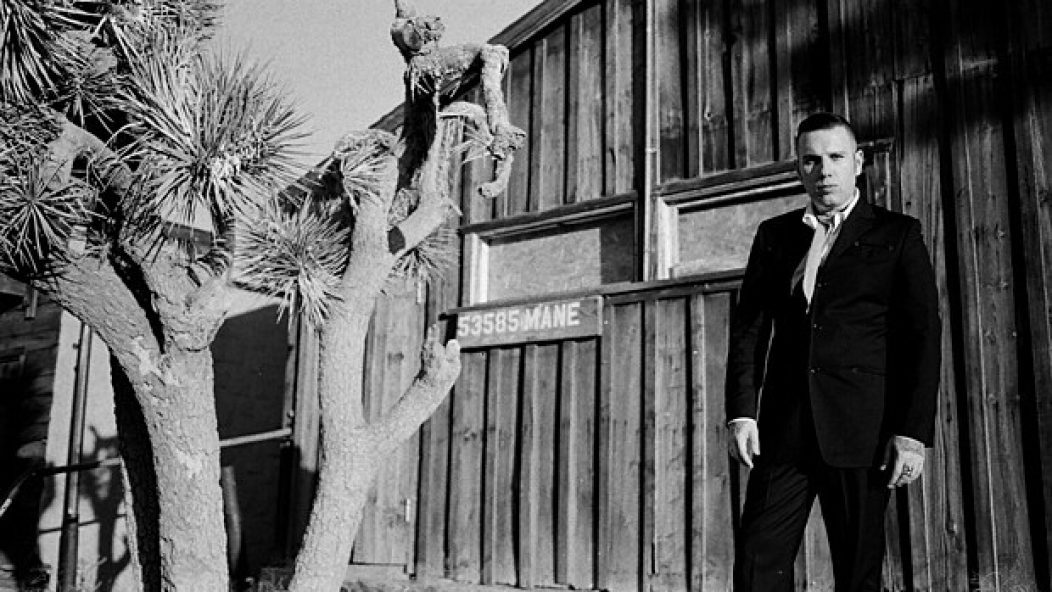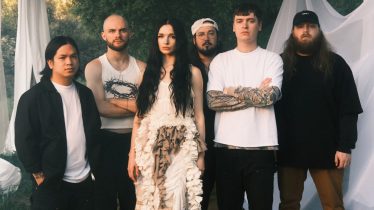
Are You Ready For The Country? Tiger Army's Nick 13 on the status of his solo career
(Photo: Patrick Moore)
NICK 13 won’t be taking a vacation this year. The founder of American psychobilly institution Tiger Army spent the beginning of the summer on tour in support of his self-titled solo album, a roots-country record issued by Sugar Hill Records in early June. Recorded with a bevy of seasoned Nashville session players, Nick 13 finds the singer-songwriter embracing a traditional country sound that’s truer to the genre’s spirit, compared to the tidal wave of crossover-pop exercises seemingly produced by accountants. Psychobilly finheads take note: On July 30, Nick is reconvening Tiger Army—with standup bassist Geoff Kresge and drummer James Meza—to mark the band’s 15th anniversary during the OC Fair at the Pacific Amphitheatre in Costa Mesa, California. The band will also play the Marquee in Tempe, Arizona, July 31, and then Nick returns to the road beginning August 11, in support of his solo release. Nick chatted with Jason Pettigrew about the cultural differences and similarities between roots country and punk rock; how this album and tour may impact Tiger Army; and whether we should blame AC/DC and Def Leppard for the state of country music today.
It’s the total, rookie, Intro To Rock Journalism question, but screw it: How was the first leg of your solo-album tour?
It was good. It’s interesting because there are certain shows where people immediately seem to get it. Because even though Tiger Army has done songs in a country vein, the entire vibe of the show is different. It’s not loud; it’s not aggressive. There’s not a pit, so certain places I felt like the first four songs [had] the audience figuring out what exactly was happening, what should they be doing, how they should be reacting. But every show wound up being good. There were definitely a number of shows where I felt like, not quite midway through the set, everyone realized, “Oh, okay, this is what’s happening musically. I can appreciate this. Something else—i.e. some crazy-fast song—isn’t going to be happening. ” People started enjoying it for what it was, because the album had just come out and not everybody had it. I’d have to imagine that, especially in some of the smaller cities, people who were aware of Tiger Army came out for something to do, just to check it out and didn’t really know what to expect. Certainly, not all the shows were huge, and some of the places we played were pretty small, but I don’t feel like there was a bad show on the tour. I walked offstage at every show feeling like we had accomplished more or less what we had set out to do.
The current culture for country is substantially different from what you’re doing. Is there a vibrant, underground roots-country scene, similar to the culture of punk?
I can say there’s definitely a strong and vibrant underground music scene for Americana—or music that’s influenced by traditional country, music that’s not particularly rock-influenced. There are different names people give it. One of the big problems is it was always known as country music, and now the phrase “country music” means something else. So what do you call it? Americana wasn’t a musical genre I was really familiar with. I mean, I knew a lot of the music but that term—which is an attempt to reconcile the fact that what is now called “country music” isn’t the country music of the past—wasn’t something I was familiar with. There are all kinds of names for it, but what really strikes me about the underground roots-music scene is how much it’s like the underground scenes and subcultures of the ’80s that lasted into the ’90s and then seemed to disappear or are on their way out with the new millennium. It actually is a scene, and it’s composed of people who have a real passion for music. I certainly remember that growing up with punk and then even with psychobilly later in the ’90s, but if that still exists in rock, I don’t know where it is, exactly.
Are you learning everything new from this experience, whether it’s people’s expectations, touring or the culture itself? I would assume there are certain actions or ways of thinking that are considered suspect.
There are definitely a lot of differences in the culture as a whole. As far as on a honky-tonk level, it’s a lot more DIY than punk. You don’t see a lot of techs—or any techs in that world. Another thing is, a lot of times in Nashville for example, there are a bunch of honkytonks. There are enough so that each crowd can sort of have their own place. So the people who are kind of looking to be on American Idol have their sort of clubs and the few that are dedicated to the real deal can go [to theirs]. A lot of times, those bands are basically playing for tips, and there’s no cover. You can cruise in off the street and someone will literally pass a jar around every 45 minutes. It’s actually a mark of status to play a gig in Nashville where there’s a cover charge.
As a whole, there are a lot of different things that happen [in that culture]. I’ll never forget the first time I went to see George Jones. It was during the recording of Power Of Moonlight up in the Bay Area. He had people walking around prior to his set selling CDs like you would sell peanuts or hot dogs at a ball game—you pass the money up the aisle and they pass the CD down. When his band started playing, I was looking at a couple of his band members and I thought, “That guy looks familiar, where have I seen him before? Have I seen him play with someone else?” Then I realized that it was all his band members that had been walking around selling the CDs. Someone told me later that’s how [the band] get to keep a decent-sized share of the profits for what they’re hocking. But it just shows you that it is similar [to punk rock] in a lot of ways, as far as the tradition it comes from. In many cases, they’re completely different and that’s what still echoes today.
It seems there’s more of a mutual respect of the culture, the music and the community versus the whole “What’s in it for me?” type of thing.
You’re right. A lot of people are doing [this music] for the love of it. They’d be doing it whether anyone was there or not. They’re happy if anyone’s in the room who gives a shit, and that’s not something I really see in the rock world that I’ve crossed paths with. I don’t want or need to compare everything to punk, but I guess what we’re talking about, there is that sort of sense of what we’re into is not what everybody else is into in the culture at large. It’s not going to be, so we’re going to enjoy it together. That’s something I remember as a kid growing up in the underground scene, for a lack of a better description. There’s not the expectation that it’s going to be anything else—and if this is it right here in this room, that’s enough.
For right now, we’re just kind of doing our own shows and we’ll see who responds to it and what the opportunities are. It’s definitely something that I’d like to be doing for quite some time. At times I’ve referred to it as the “solo project,” but “project” sort of implies that it has a finite amount of time that’s going to be devoted to it, and that’s not necessarily the case. I’d like to be doing it and Tiger Army in tandem for as long as I can.
What is the status of Tiger Army?
I’m fortunate to just kind of go where my inspiration takes me right now. I’ve learned an incredible amount, musically, making this record. One thing that’s interesting about this record and the whole process of recording it and touring it, is this is the first time I feel like I’ve learned some different things, from rhythm patterns to a lot of things that relate to approach in terms of learning the craft of traditional country. I should have some new tricks up my sleeve that I can funnel back, because I’ve always been looking for the next step with Tiger Army. How do I push that a little bit farther? How do I put another twist on it? How do I keep it fresh for myself? When all is said and done with the playing on and promoting this record, I think I’m really just going to look inside and say, “What am I feeling right now? Where does my inspiration lie right now? Do I feel like I want to keep going with this and get into a second Nick 13 record, or am I ready to switch gears and get back to some harder-rocking stuff?” Which I know will happen eventually; it’s just too big a part of who I am musically to stay away from that forever. But this has been a nice change of pace. I think when the time comes to decide, I could be ready fairly quickly to hit the studio with either solo or Tiger Army.
What’s the window on that?
It’s hard to say, because I don’t know exactly how long I’m going to be touring this record. Definitely, the label’s expectations are different than most rock labels are as far as touring. Sometimes, Americana records catch fire quite a while after they’re out, and sometimes the artists don’t tour at all—or they tour on a very limited basis. I kind of figured they’d expect me to go out on the road and stay there—because that’s what most labels in my experience want—but that’s not necessarily how they’re looking at it.
I’m not a country music fan, only because I see what’s being passed off as country over the last 20 years. But I still can’t understand why “Nashville Winter” or “Carry My Body Down” couldn’t be full-on country hits. Is there some weird business party line with what gets embraced and what doesn’t?
One thing I’ve gotten an education about that I wasn’t aware of is just there’s a whole different sort of radio thing for Americana music. It’s a different network than rock: A lot of NPR stations, AAA stations, college radio stations spin it pretty heavily, and it has its own charts. It does get played, but just not in the places that typically play either mainstream country or mainstream rock, but it is out there on the airwaves. I was able to do a few things on this tour, like go in and do acoustic stuff on the air at an NPR station. That just wouldn’t happen with Tiger Army.
I know [my album] being played on the new country stations I never listen to is unlikely, just because they don’t really play anything—at least as of right now—that really sounds like country music. There are other places out there that are supporting the real deal, whether it’s old or new, and I think that’s really cool. It’s funny because in the early ’90s, there was a trend to go to these pop-based song structures in country and to simply put some window-dressing on it—throw a pedal steel or a fiddle on it, then have a vocal with a pretty pronounced twang in it. But everything else about it [was] sort of ’80s pop-rock song structure. Well, as time went on, there’s a reaction in the industry against the window dressing, so they’ve gotten rid of the pedal steel and the fiddle. Those last links to real country music have kind of been bulldozed over, because they’re kind of going for the crossover, trying to get [Middle America] on board. In some cases, these singles you hear [are] just pop-rock, and there’s no connection to the roots at all. I think that’s a shame.
Should we blame Mutt Lange? [The producer of classic albums by AC/DC and Def Leppard responsible for the pop crossover of his then-wife, Shania Twain. —rock minutiae ed.]
I won’t point any specific fingers. But I can’t feel too badly if I’m not played on a station that wouldn’t play a song off Merle Haggard’s new record. alt








